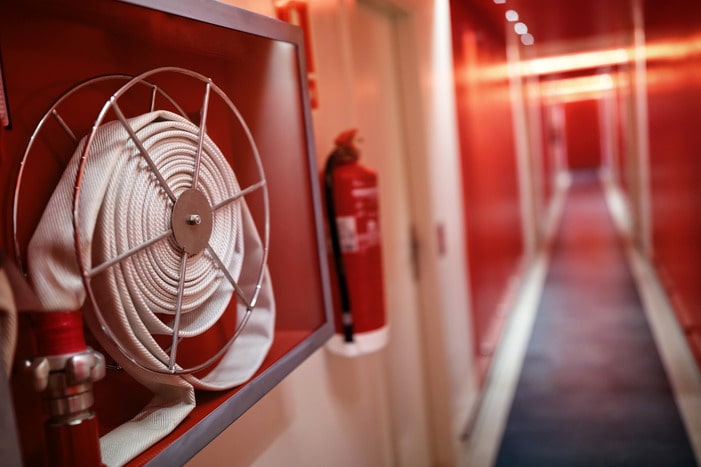
- July 6, 2023
- |security guard company
- | 0
Fire Extinguisher Training –
As a reputable fire watch guard company, XPressGuards understands the critical role of fire extinguisher training in the effective response to fire incidents. Fire extinguishers are essential tools in combating small fires, providing fire watch guards with the means to intervene swiftly before the situation escalates. In this article, we will explore the importance of fire extinguisher training for fire watch guards, covering the key components of training, understanding fire classes, proper handling and usage, and ongoing maintenance.
1. Importance of Fire Extinguisher Training
Fire extinguisher training is a vital aspect of fire watch guard preparedness. It equips fire watch guards with the knowledge and skills required to handle fire incidents effectively. By receiving comprehensive training, fire watch guards become familiar with various fire extinguisher types, understand fire classification, and learn proper techniques for extinguisher usage. This training empowers them to respond promptly and confidently in the event of a fire emergency, ensuring the safety of occupants and minimizing potential damages.
2. Understanding Fire Classes
Fire extinguisher training begins with a thorough understanding of fire classes. Fires are classified into different classes based on the type of fuel involved, and each class requires a specific type of fire extinguisher for effective suppression. The five main fire classes are as follows:
- Class A: Fires involving ordinary combustible materials, such as wood, paper, cloth, or plastics.
- Class B: Fires involving flammable liquids, such as gasoline, oil, or solvents.
- Class C: Fires involving energized electrical equipment or live electrical fires.
- Class D: Fires involving combustible metals, such as magnesium, titanium, or lithium.
- Class K: Fires involving cooking oils, fats, or greases typically found in commercial kitchens.
Fire watch guards undergo training to identify the fire class accurately, enabling them to select the appropriate fire extinguisher for effective suppression.
3. Types of Fire Extinguishers
Fire extinguishers come in various types, each designed to tackle specific fire classes. The common types of fire extinguishers include:
- Water-based extinguishers (Class A fires)
- Foam-based extinguishers (Class A and Class B fires)
- Dry powder extinguishers (Class A, B, and C fires)
- Carbon dioxide (CO2) extinguishers (Class B and Class C fires)
- Wet chemical extinguishers (Class K fires)
- Class D extinguishers (Class D fires)
Fire watch guards receive in-depth training on the different types of fire extinguishers, their capabilities, and limitations. They become familiar with the appropriate use of each extinguisher, ensuring effective fire suppression while minimizing the risk of exacerbating the situation.
4. Proper Handling and Usage
Fire extinguisher training emphasizes the proper handling and usage techniques to maximize efficiency and personal safety. Key aspects covered in the training include:
– P.A.S.S Technique: Fire watch guards are trained in the P.A.S.S (Pull, Aim, Squeeze, Sweep) technique for proper extinguisher operation. They learn to pull the pin, aim at the base of the fire, squeeze the handle to discharge the extinguishing agent, and sweep the nozzle from side to side to extinguish the flames effectively.
– Safety Precautions: Fire watch guards are instructed on safety precautions, such as standing at a safe distance from the fire, considering escape routes, and assessing the fire’s size and potential hazards before attempting to extinguish it.
– Positioning: Proper positioning is crucial for effective fire extinguisher usage. Fire watch guards learn how to position themselves to maintain a safe distance from the fire while ensuring maximum coverage during discharge.
– Controlled Extinguishing: Fire watch guards are trained to avoid spraying the extinguishing agent directly onto hot surfaces or directly into electrical equipment to prevent further damage or injury.
– Post-Extinguishing Procedures: Training covers the importance of monitoring the extinguished area for potential reignition and ensuring proper reporting of the incident to the appropriate authorities.
5. Ongoing Maintenance and Inspection
Fire extinguisher training emphasizes the importance of regular maintenance and inspections to ensure the reliability and functionality of extinguishers. Fire watch guards learn to perform visual inspections, checking for proper pressure, intact safety seals, and visible signs of damage or corrosion. They also learn to report any issues promptly to the designated personnel for necessary repairs or replacements. Fire watch guards play a vital role in ensuring that fire extinguishers are always in optimal working condition, providing an immediate response when needed.
6. Scenario-Based Training
To enhance practical skills and preparedness, fire watch guards undergo scenario-based training exercises. These exercises simulate various fire scenarios and allow fire watch guards to apply their knowledge and skills in a realistic environment. Through hands-on training, they develop confidence and efficiency in handling fire extinguishers, making critical decisions, and effectively responding to fire incidents.
7. Regular Refresher Training
Fire extinguisher training is not a one-time event; it requires regular refresher training to reinforce skills and keep fire watch guards updated with the latest techniques and safety protocols. Refresher training sessions ensure that fire watch guards remain competent and prepared to handle fire incidents effectively. Ongoing training also provides an opportunity to introduce new fire extinguisher technologies or changes in fire safety regulations.
Fire extinguisher training is a vital component of fire watch guard preparedness. By understanding fire classes, becoming familiar with different types of fire extinguishers, and receiving comprehensive training on proper handling and usage techniques, fire watch guards are equipped to respond swiftly and effectively in the event of a fire emergency.
XPressGuards is committed to providing its fire watch guards with the necessary knowledge and skills to confidently handle fire incidents, ensuring the safety of occupants and mitigating potential damages. Through ongoing training, maintenance, and adherence to fire safety protocols, fire watch guards serve as protectors and are instrumental in creating a fire-safe environment for all. Contact us to learn more.


